Hisserdude
Dynastes
Here are the species that I currently have for sale, please read all of the Terms & Conditions before ordering! Minimum $25
Cockroaches:
Aglaopteryx gemma "Key Largo, FL" (Little Gem Roach)
This small but beautiful Ectobiid hails from the southeastern US, and has eluded culture for quite some time. Thankfully they've actually proven rather easy to breed, and enjoy humid and warm conditions, with good airflow. All life stages climb well, but thankfully adults of neither sex can fly. *FL Legal*
(Caresheet)
10 Mixed nymphs: $20
20 Mixed nymphs: $30

Ancaudellia hamifera (Golden-Butt Roach)
New to the US hobby, very rarely offered here. This is one of the slowest breeding Panesthiinae in the US hobby, but they are large and quite hardy. Adults and large nymphs have a thick layer of fine, golden hairs on their last few abdominal segments, hence the common name.
(Caresheet)
8 Small nymphs: $100


Arenivaga tonkawa "San Antonio, TX" (Tonkawa Sand Roach)
A nice little native sand roach, one of the easiest to culture. They seem to prefer higher humidity than some other Arenivaga spp., but similar to the rest of the genus, need very high ventilation levels.
(Caresheet)
8 Small nymphs: $20


Balta vilis (Plain Yellow Roach)
A small delicate species that is a plain but attractive yellow color. Fairly easy to set up and prolific if kept right, a must have for Ectobiid enthusiasts. First US offering in years!
(Caresheet)
10 Mixed: $25
25 Mixed: $30
50 Mixed: $45
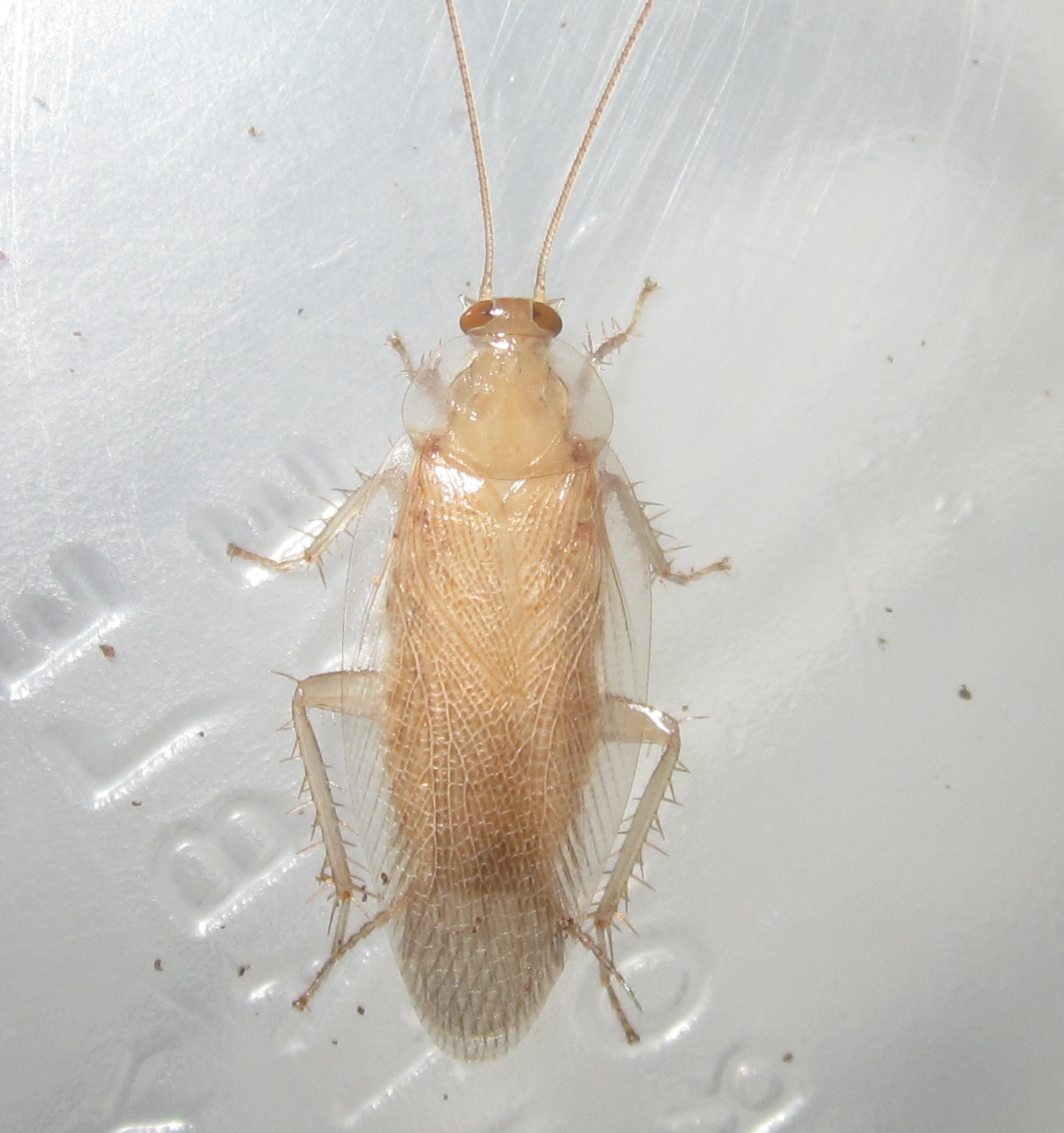
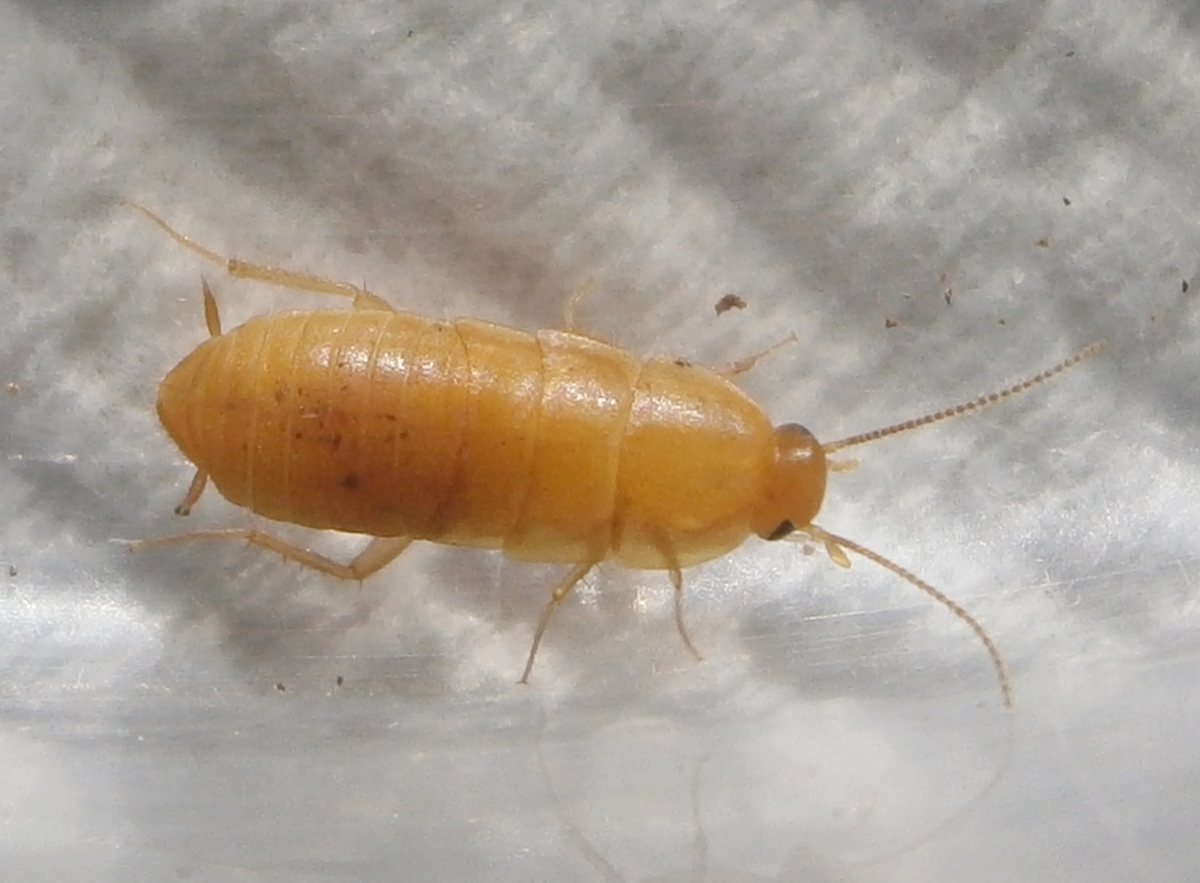
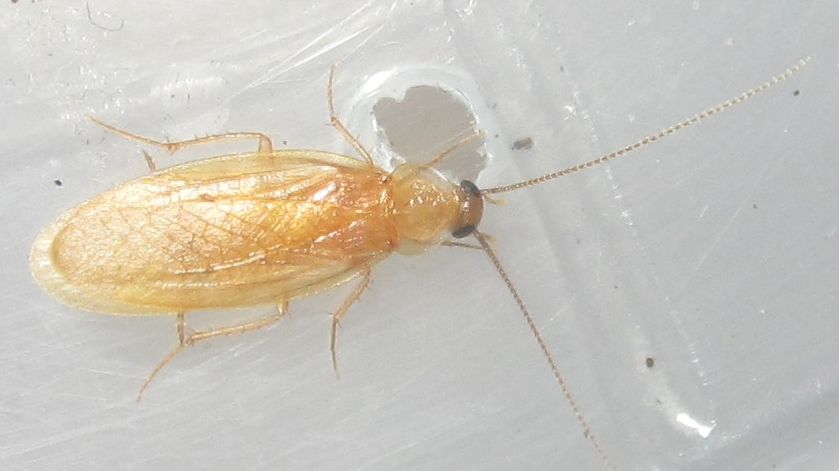
Dipteretrum hanstroemi (Hanström's Little Runners)
A very underrated African Ectobiid that breeds rather prolifically in warm, dry, well ventilated conditions. They can be prone to bent/shortened antennae issues if humidity is too high. They have some feeder potential, though all life stages climb well.
(Caresheet)
10 Small nymphs: $20

(Caresheet)
10 Mixed nymphs: $25
20 Mixed nymphs: $40
30 Mixed nymphs: $50

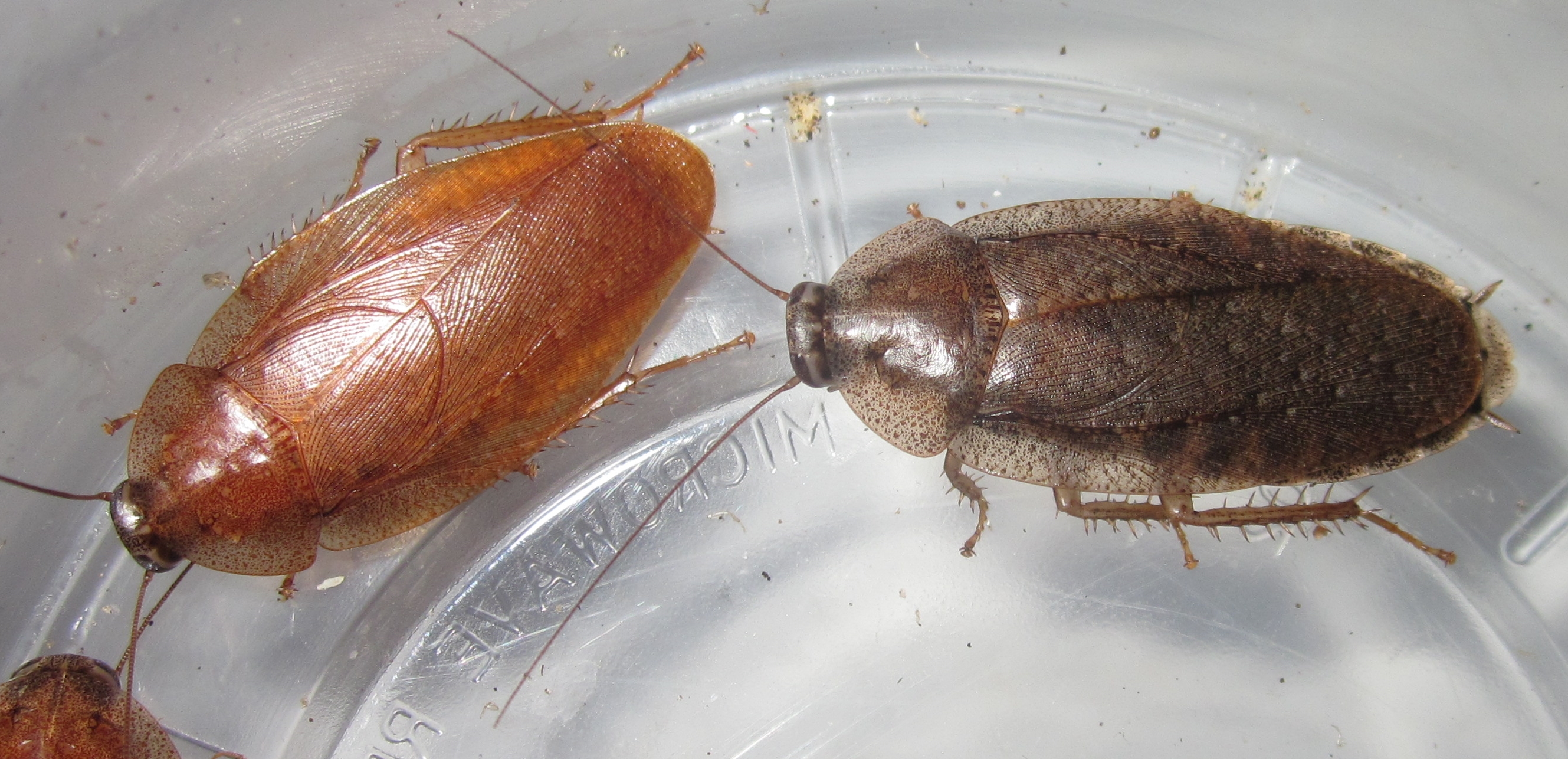
Euthlastoblatta diaphana (Transparent Belle Roach)
This small species is new to US culture, but has been in the hobby overseas for quite some time. They do well kept humid but well ventilated, and are rather prolific. Their large nymphs are among the prettiest Ectobiids I've kept.
(Caresheet)
10 Small nymphs: $25


Gromphadorhina portentosa "LLE Mahogany" (Mahogany Hissing Cockroach) *Pure*
This wonderful strain of PURE portentosa was isolated from the old "1972 Cleveland Aquarium" stock, and was selected for unusually pale and rich mahogany looking individuals.
(Caresheet)
10 Mixed nymphs: $30
20 Mixed nymphs: $50
60 Mixed nymphs: $75


Gromphadorhina portentosa "Masoala" (Common Madagascar Hisser) *Pure*
This is a brand new, PURE hisser strain for the US hobby, that were formerly cultured in a Belgium insectarium. Differs a bit in coloration from the "1972 Cleveland Aquarium" stock, care is much the same though.
(Caresheet)
8 Small nymphs: $45



Gromphadorhina sp. "Unidentified" (Sidestripe Hissing Cockroach) *Pure*
Most likely a pure, distinct locality/subspecies of G.portentosa. An impressive strain both in coloration and size, sadly the locality is unknown. Very uncommon in the hobby, rarely available!
(Caresheet)
5 Small/Medium adult males: $25



Margattea nimbata (Raindrop Roach)
A neat, small Ectobiid brand spanking new to US culture. Easy to breed and tolerant of a wide variety of conditions.
(Caresheet)
10 Mixed: $20
20 Mixed: $30


Neostylopyga rhombifolia "Chinese Hobby Stock" (Harlequin Roach)
A very pretty species that seems to regularly crash and boom in the US hobby. Many strains are finicky and have issues with ooths failing to hatch, random nymph die offs, etc., this strain doesn't appear to have that issue though. Males of this stock have pretty red coloration on their abdomens, females are more black.
10 Small nymphs: $60


Nocticola sp. "Malaysia" (Malaysian Micro-roach)
Smallest roach in the hobby, parthenogenetic, could make for a good occasional micro-feeder, or cleaner crew addition in bioactive setups.
(Caresheet)
8 Mixed: $20 (Ask for Availability)
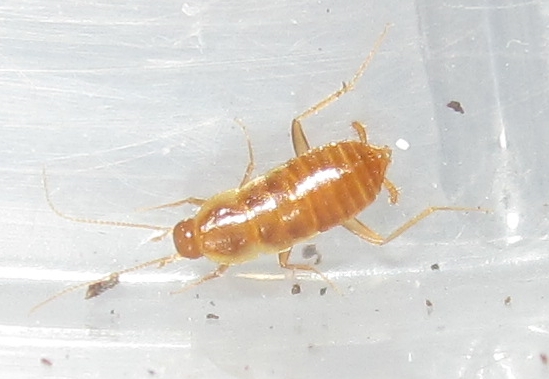
Panesthia angustipennis cognata "Cambodia" (Orangeback Roach)
New and very rarely available in the US hobby, this is a slow growing and breeding species that needs a substrate of rotten wood. Medium/Large nymphs are beautifully patterned, and the chunky little adults are adorable as well!
(Caresheet)
15 Small nymphs: $110
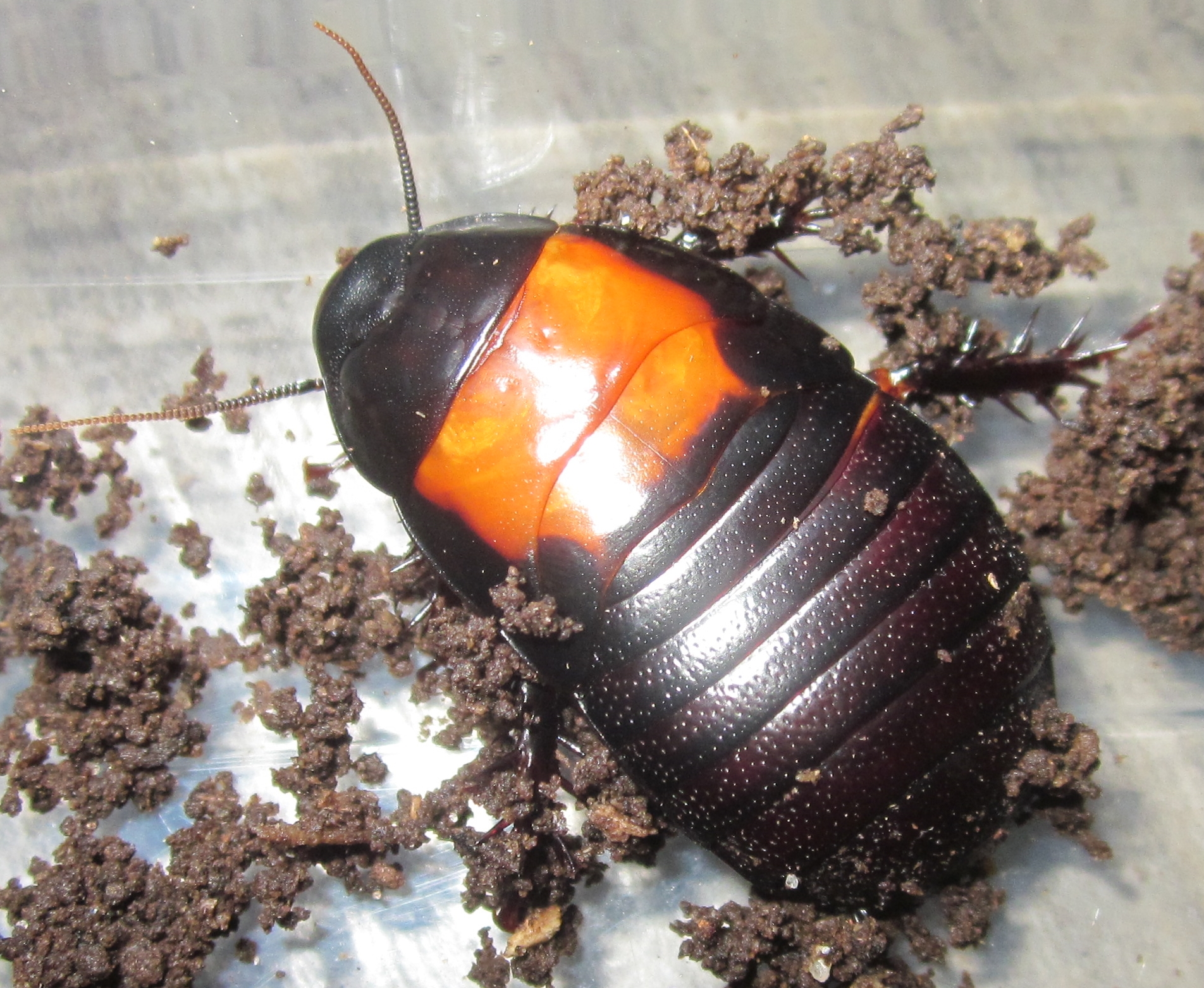
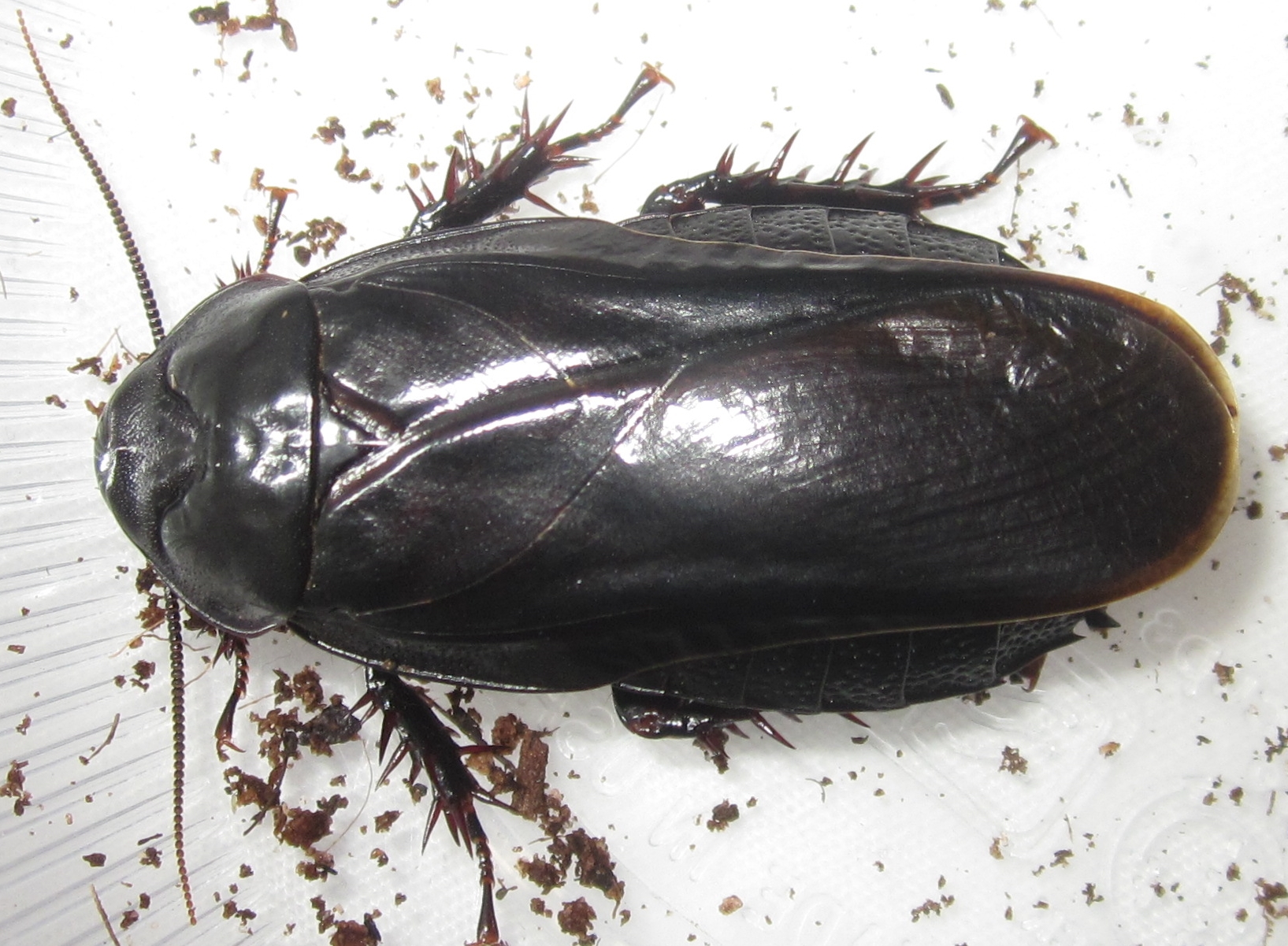
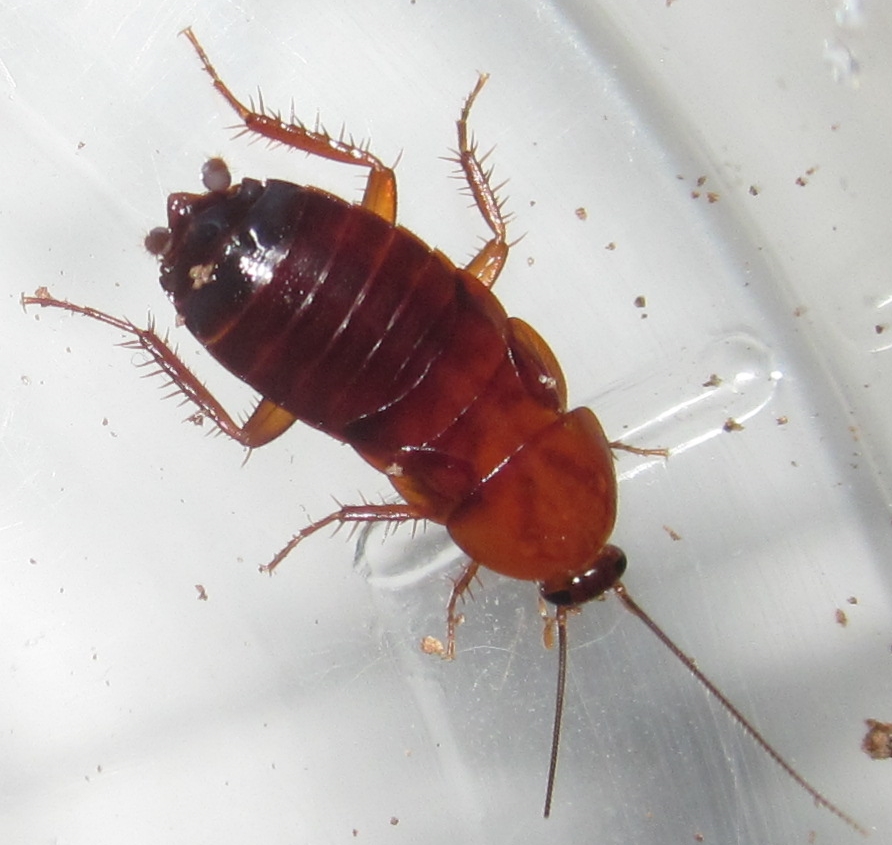
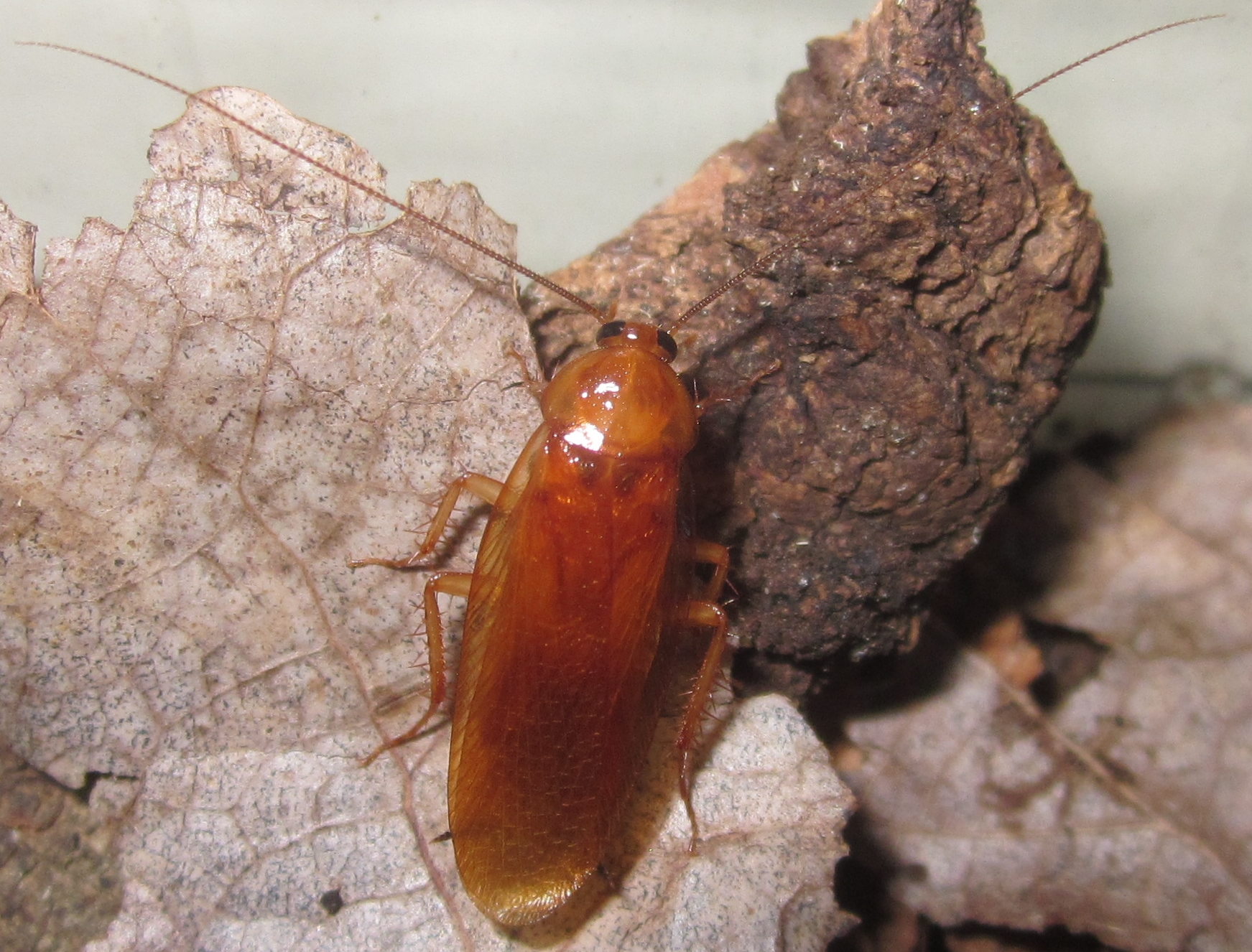
Perisphaerus punctatus "Macao" (Punctate Roly-poly Roach)
A brand new species to culture, first US offering! This species is very similar to P.pygmaeus, but is larger, glossier, more arboreal, hardier, and can handle slightly drier setups as well (though high air humidity is important). At last, an alternative to P.pygmaeus in the hobby!
(Caresheet)
8 Small nymphs: $130

Plectoptera poeyi (Florida Beetle Roach)
A small beetle mimic, this species is very difficult to find in the wild, and even more rare in culture. They are fairly finicky, and prefer high humidity, decent ventilation and multiple feeding areas. *FL Legal*
(Caresheet)
8 Mixed nymphs: $30


5 Small/Medium adult males: $25


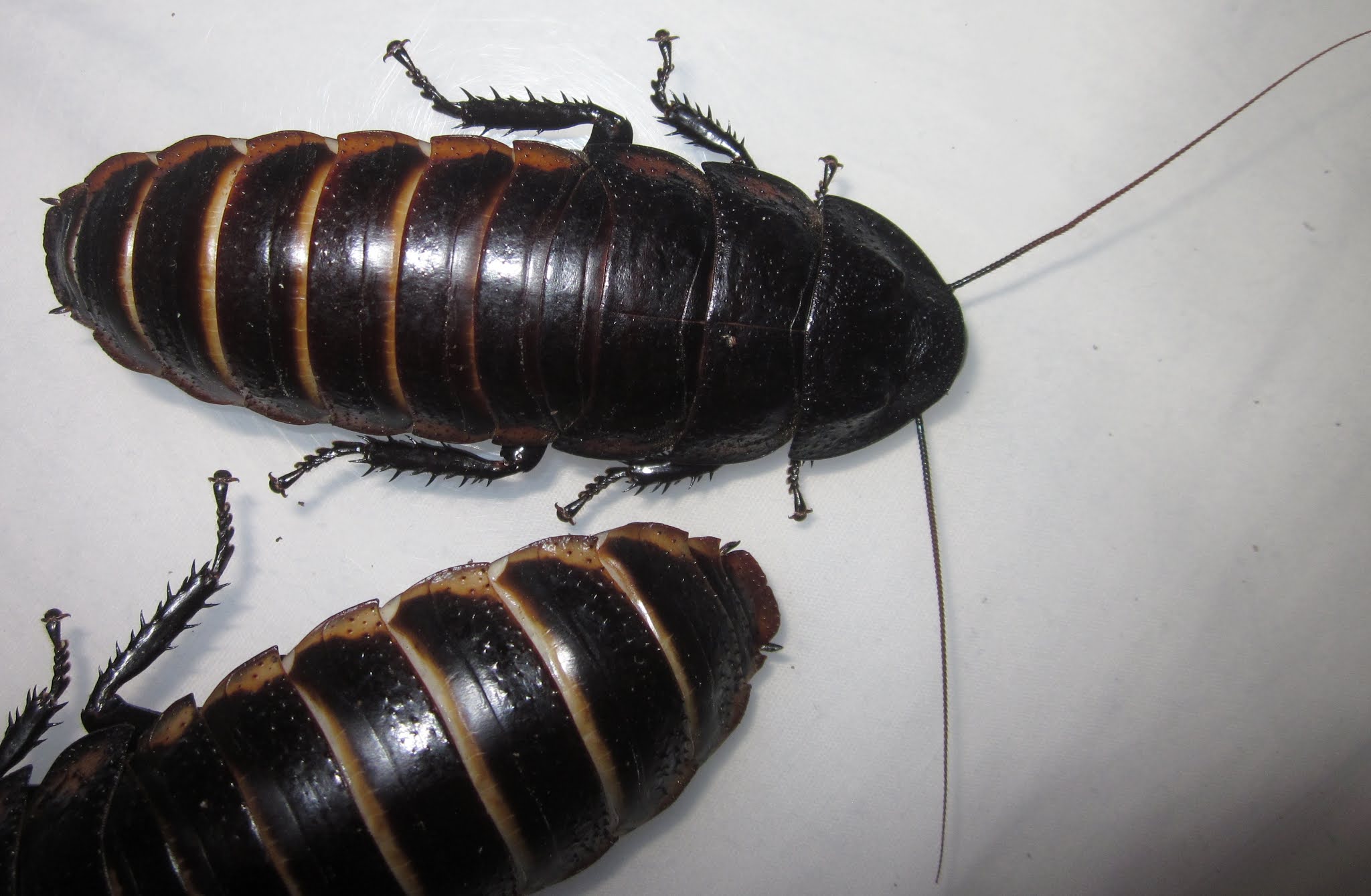
Pseudomops septentrionalis "San Antonio, TX" (Pale-bordered field roach)
Parent stock collected in 2016. A beautiful US native that has brightly colored adults, and is prolific to boot!
(Caresheet)
12 Small nymphs: $25
24 Small nymphs: $40

Pycnoscelus surinamensis "Dark" (Dark Surinam Roaches)
A dark strain of Surinam roaches that were accidentally being traded as P.nigra (Shadow Roaches). The adults in this culture range from dark brown to black. Care is the same as other surinamensis. *FL Legal*
10 Mixed: $12
20 Mixed: $20

(Caresheet)
10 Small nymphs: $25


*LAG for all Camel Crickets only if local temps 77F° or below*
Ceuthophilus agassizii "Kuna, ID" (Scrubland Camel Cricket)
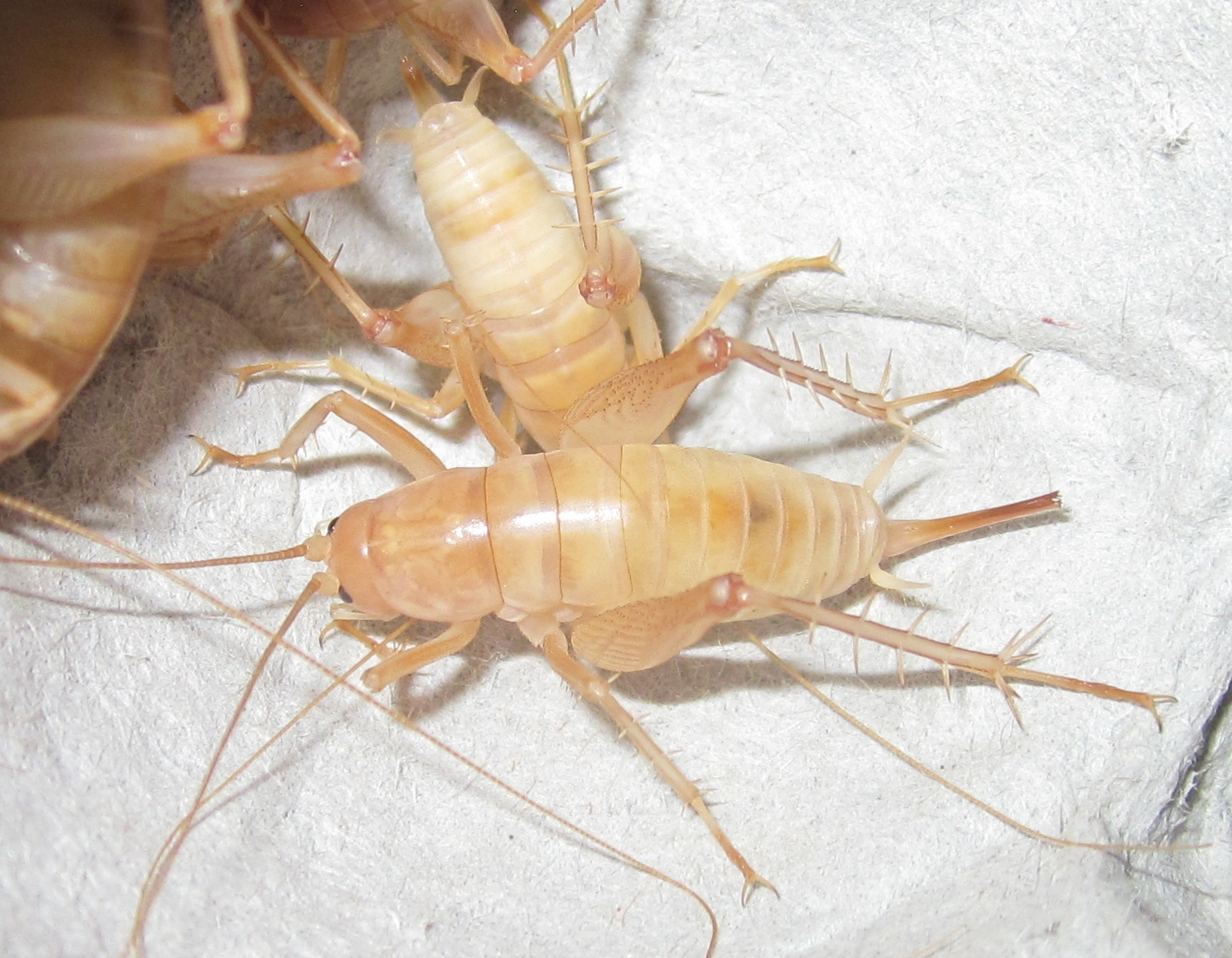
Ceuthophilus gracilipes gracilipes "Montgomery, AL" (Slender-legged Camel Cricket)
Largest US native camel cricket! Easy to breed, pretty tolerant of crowding, but they do like their space! Definitely some occasional feeder potential, and colonies don't smell or make noise!
(Caresheet)
8 Mixed nymphs: $45 + shipping
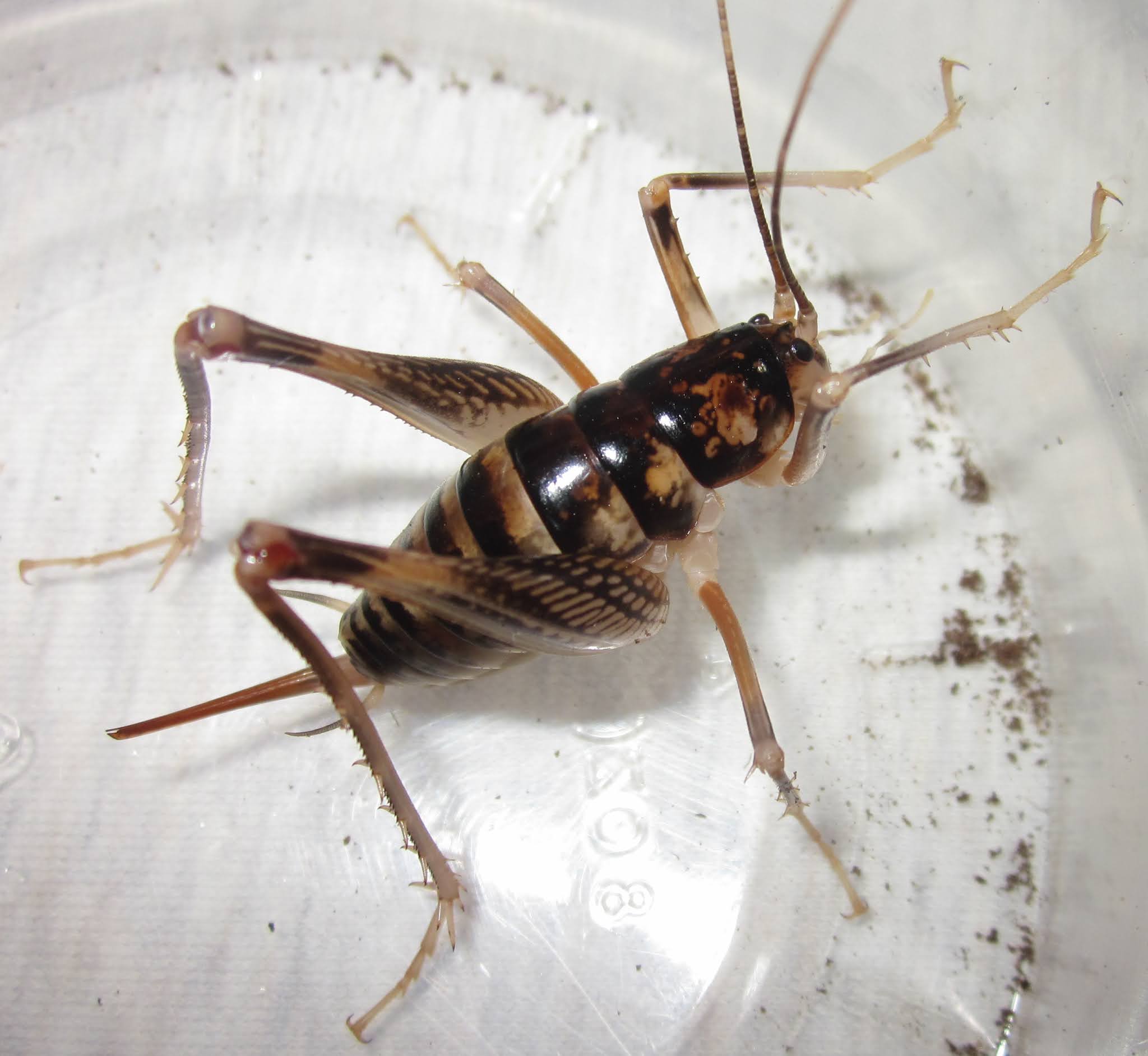
Flies:

A beautiful species similar in appearance and care to A.maculatum. These can be a bit slow to establish at first, but are quite prolific when they do breed, (like most members of this genus). The amount of white patterning varies greatly from individual to individual.
10 Mixed: $20


Armadillidium klugii (Clown Roly-poly)
This is a "hobby line" that appears to be a mix of the "Montenegro" and "Dubrovnik" localities, such mixes are common and are unfortunately often mislabeled as being pure locales of one or the other. Prefers a good humidity gradient, and high ventilation.
10 Mixed: $12

Cubaris sp. "Panda King" (Panda King Isopod)
A very prolific and easy to breed Cubaris that tolerates a wide level of ventilation and temperature ranges.
8 Mixed: $25

Cubaris sp. "Rubber Ducky - Blondish" (Rubber Ducky Isopod)
The isopod that started the great "Cubaris Craze", the Rubber Ducky isopod. This particular strain throws out completely orange individuals, darker, more normal individuals, and intergrade between the two. Easy to keep, if a bit slow breeding.
8 Mixed: $65 (Ask for Availability)



Helleria brevicornis "Provence-Alpes-Côte d'Azur, France" (Giant Roly-Poly)
The largest terrestrial conglobating (curling) isopod, needs a deep organically rich substrate. Slow growing and breeding, but gives birth to large litters once a year. A mild winter cool period (60-65F°) is needed for yearly reproduction.
8 Small individuals: $130

Nesodillo arcangelii "Shiro Utsuri" (Shiro Utsuri Isopod)
This beautiful strain of N.arcangelii appears to represent the "Dalmatian" type mutation for this species, supposedly isolated from the "Silver Ghost" strain. The name "Shiro Utsuri" is a reference to a black and white Koi fish morph. Keep this species humid and moderately to highly ventilated, and they'll thrive.
10 Mixed: $30

Porcellio hoffmannseggi (Titan Isopod)
A giant amount isopods, this also happens to be one of the more forgiving and prolific Spanish Porcellio species. High ventilation and a 50/50 humidity gradient with lots of hides seems to work well for this species.
8 Small individuals: $30 (Ask For Availability)

Porcellio scaber "Lottery Ticket" (Rough Isopod)
A mix of various recognized morphs, with this strain mainly producing calicos, normals and the odd white-out. Large colonies are quite pleasant to look at, and perfect for getting a head start on isolating specific morphs!
10 Mixed: $12
20 Mixed: $20



Trachelipus rathkii "Ada County, ID" (Swamp Isopod)
This locale throws out both grey and orange/calico looking individuals. An easy to breed and prolific isopod species, needs consistently high humidity.
10 Mixed: $10


Springtails & Mites:
Coecobrya sp. "Tropical Pink" (Tropical Pink Springtails)
ex. Sinella curviseta. Very prolific species that can handle a wide range of conditions, but does best in consistently humid setups.
20+ Mixed: $5
50+ Mixed: $10
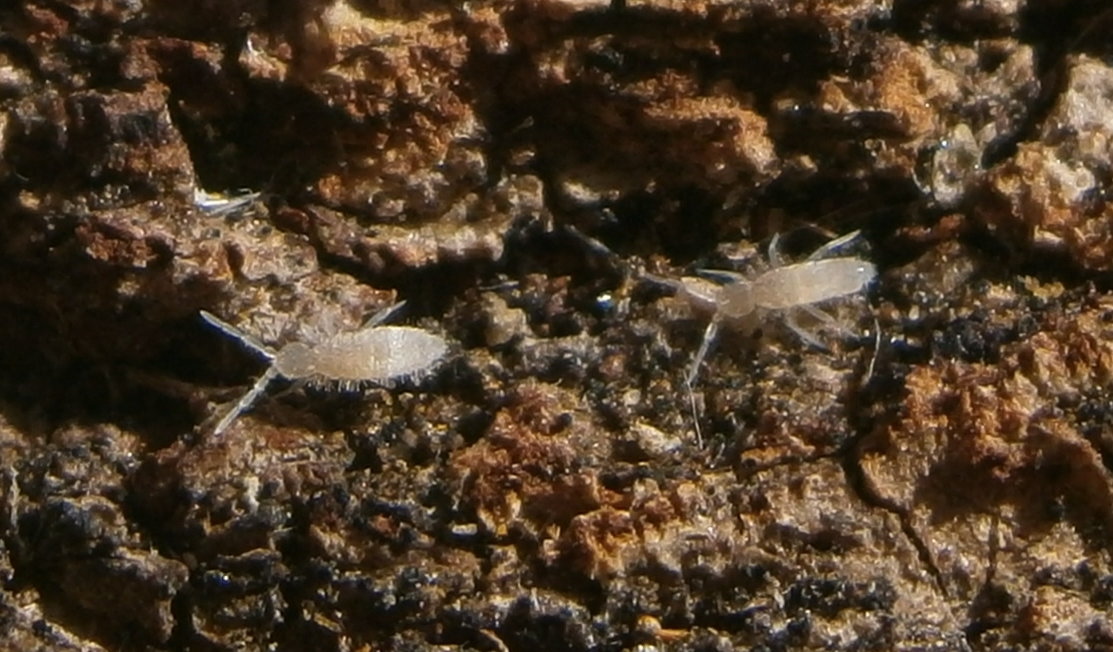
Cyphoderus sp. "Bylas, AZ" (Bylas Ant Springtails)
Small, silvery white springtails that breed prolifically in humid conditions.
20+ Mixed: $15
50+ Mixed: $25

20+ Mixed: $5
50+ Mixed: $10 (Ask for Availability)
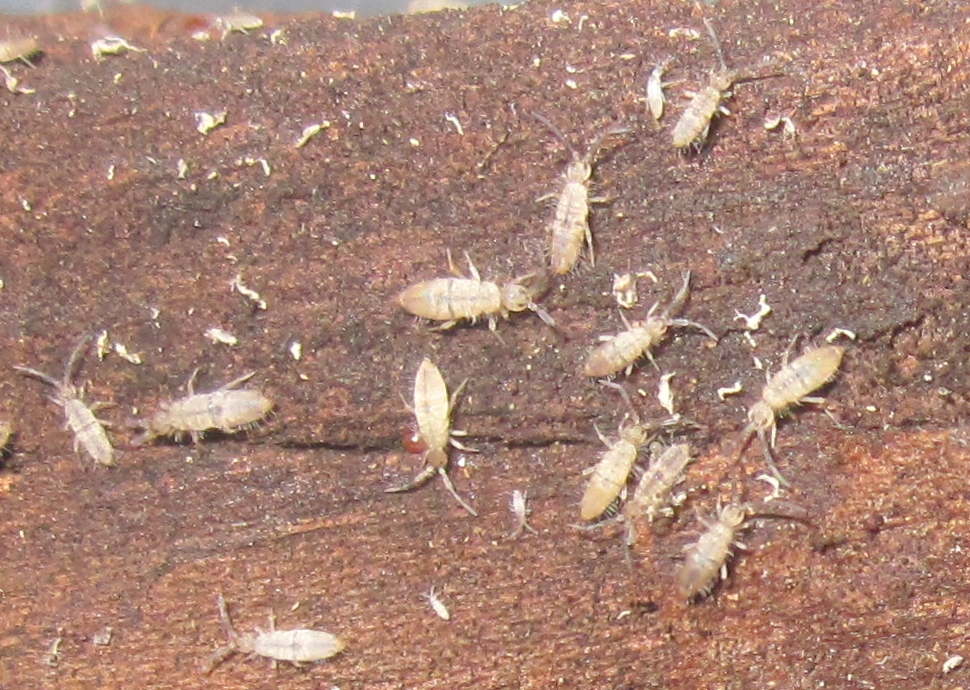
cf. Willowsia sp. "Kota Kinabalu" (Malaysian Silver Scaly Springtails)
An unidentified species from Kota Kinabalu, Malaysia, new to US culture! Tolerates a variety of humidity levels, and is rather prolific. *Dry Hardy*
20+ Mixed: $5
50+ Mixed: $10


Oribatida sp. "Red" (Red Oribatid Mite)
These mites are good for really only one thing... outcompeting grain mites. They have the same ecological niche, however unlike grain mites they rarely attach to insects in a hypopus stage (I have seen them do it, but infrequently). They're a lesser evil if you will, an O.K alternative to grain mites if you have a lot of grain mite issues.
20+ Mixed: $5

Stratiolaelaps scimitus *ex Hypoaspis miles* (Predatory Mite)
Great fungus gnat control, and they also feed on grain mites, certain springtails, and nematodes.
15+ Mixed: $8 (Ask for Availability)
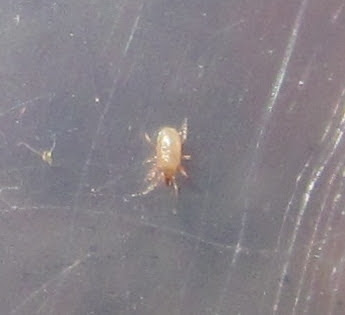
Desert Predatory Mites (Mesostigmata sp. "Idaho")
An unknown species of predatory mite, they seem very well adapted to drier climates and thrive in my darkling beetle enclosures, where they mostly seem to feed on grain mites. Similar to the above S.scimitus, but faster, glossier and not hairy at all, will sometimes exhibit phoresy when they run out of food.
15+ Mixed: $8 (Ask for Availability)

Orders $50 or Higher Get ONE Free Group of Any of these spp:
10 Aglaopteryx gemma
8 Cubaris sp. "Panda King"
8 Nesodillo arcangelii "Shiro Utsuri"
12 Pseudomops septentrionalis
Orders $100 or Higher Get ONE Free Group of Any of these spp:
10 Gromphadorhina portentosa "LLE Mahogany"
8 Panesthia angustipennis cognata "Cambodia"
8 Plectoptera poeyi
Cockroaches:
Aglaopteryx gemma "Key Largo, FL" (Little Gem Roach)
This small but beautiful Ectobiid hails from the southeastern US, and has eluded culture for quite some time. Thankfully they've actually proven rather easy to breed, and enjoy humid and warm conditions, with good airflow. All life stages climb well, but thankfully adults of neither sex can fly. *FL Legal*
(Caresheet)
10 Mixed nymphs: $20
20 Mixed nymphs: $30

Ancaudellia hamifera (Golden-Butt Roach)
New to the US hobby, very rarely offered here. This is one of the slowest breeding Panesthiinae in the US hobby, but they are large and quite hardy. Adults and large nymphs have a thick layer of fine, golden hairs on their last few abdominal segments, hence the common name.
(Caresheet)
8 Small nymphs: $100


Arenivaga tonkawa "San Antonio, TX" (Tonkawa Sand Roach)
A nice little native sand roach, one of the easiest to culture. They seem to prefer higher humidity than some other Arenivaga spp., but similar to the rest of the genus, need very high ventilation levels.
(Caresheet)
8 Small nymphs: $20


Balta vilis (Plain Yellow Roach)
A small delicate species that is a plain but attractive yellow color. Fairly easy to set up and prolific if kept right, a must have for Ectobiid enthusiasts. First US offering in years!
(Caresheet)
10 Mixed: $25
25 Mixed: $30
50 Mixed: $45

Compsodes schwarzi (Schwarz's Hooded Roach)
Second smallest roach in the hobby, prolific and a great micro-feeder! *FL Legal*
(Caresheet)
25 Mixed: $20
50 Mixed: $35
100 Mixed: $60
200 Mixed: $100
200 Mixed: $100
Dipteretrum hanstroemi (Hanström's Little Runners)
A very underrated African Ectobiid that breeds rather prolifically in warm, dry, well ventilated conditions. They can be prone to bent/shortened antennae issues if humidity is too high. They have some feeder potential, though all life stages climb well.
(Caresheet)
10 Small nymphs: $20

Epilamprinae sp. "Kota Kinabalu, Malaysia" (Borneo Leaf Mimic)
An unidentified (and likely undescribed) species from Malaysia, one of the hardiest and easiest to breed Epilamprids in the hobby. Beautiful, with females usually being an olive brown color, males often a brighter orange.
(Caresheet)
10 Mixed nymphs: $25
20 Mixed nymphs: $40
30 Mixed nymphs: $50


Euthlastoblatta diaphana (Transparent Belle Roach)
This small species is new to US culture, but has been in the hobby overseas for quite some time. They do well kept humid but well ventilated, and are rather prolific. Their large nymphs are among the prettiest Ectobiids I've kept.
(Caresheet)
10 Small nymphs: $25


Gromphadorhina portentosa "LLE Mahogany" (Mahogany Hissing Cockroach) *Pure*
This wonderful strain of PURE portentosa was isolated from the old "1972 Cleveland Aquarium" stock, and was selected for unusually pale and rich mahogany looking individuals.
(Caresheet)
10 Mixed nymphs: $30
20 Mixed nymphs: $50
60 Mixed nymphs: $75


Gromphadorhina portentosa "Masoala" (Common Madagascar Hisser) *Pure*
This is a brand new, PURE hisser strain for the US hobby, that were formerly cultured in a Belgium insectarium. Differs a bit in coloration from the "1972 Cleveland Aquarium" stock, care is much the same though.
(Caresheet)
8 Small nymphs: $45



Gromphadorhina sp. "Unidentified" (Sidestripe Hissing Cockroach) *Pure*
Most likely a pure, distinct locality/subspecies of G.portentosa. An impressive strain both in coloration and size, sadly the locality is unknown. Very uncommon in the hobby, rarely available!
(Caresheet)
5 Small/Medium adult males: $25



A neat, small Ectobiid brand spanking new to US culture. Easy to breed and tolerant of a wide variety of conditions.
(Caresheet)
10 Mixed: $20
20 Mixed: $30


Neostylopyga rhombifolia "Chinese Hobby Stock" (Harlequin Roach)
A very pretty species that seems to regularly crash and boom in the US hobby. Many strains are finicky and have issues with ooths failing to hatch, random nymph die offs, etc., this strain doesn't appear to have that issue though. Males of this stock have pretty red coloration on their abdomens, females are more black.
10 Small nymphs: $60


Nocticola sp. "Malaysia" (Malaysian Micro-roach)
Smallest roach in the hobby, parthenogenetic, could make for a good occasional micro-feeder, or cleaner crew addition in bioactive setups.
(Caresheet)
8 Mixed: $20 (Ask for Availability)
Panesthia angustipennis cognata "Cambodia" (Orangeback Roach)
New and very rarely available in the US hobby, this is a slow growing and breeding species that needs a substrate of rotten wood. Medium/Large nymphs are beautifully patterned, and the chunky little adults are adorable as well!
(Caresheet)
8 Small nymphs: $70
15 Small nymphs: $110
Parcoblatta americana "Table Rock, Boise - ID" (American Wood Roach)
US native, can take a while to get cultures established, but makes for a good occasional feeder that breeds at room temps, and won't infest your house!
(Caresheet)
10 Mixed nymphs: $20
20 Mixed nymphs: $30
Perisphaerus punctatus "Macao" (Punctate Roly-poly Roach)
A brand new species to culture, first US offering! This species is very similar to P.pygmaeus, but is larger, glossier, more arboreal, hardier, and can handle slightly drier setups as well (though high air humidity is important). At last, an alternative to P.pygmaeus in the hobby!
(Caresheet)
8 Small nymphs: $130

Plectoptera poeyi (Florida Beetle Roach)
A small beetle mimic, this species is very difficult to find in the wild, and even more rare in culture. They are fairly finicky, and prefer high humidity, decent ventilation and multiple feeding areas. *FL Legal*
(Caresheet)
8 Mixed nymphs: $30


Princisia vanwaerebeki "Big/Black" (Vibrant Hisser) *Pure*
The most basic form of this species in cultivation, with most adults sporting black base coloration, with orange/yellowish abdominal margins. This particular stock throws out a decent number of completely black adults, which is unusual for pure stock of this species, but all males of this stock have the characteristic notch on the anterior margins of their pronotums, while hybrid lines normally have variable pronotum shapes.
(Caresheet)
5 Small/Medium adult males: $25


Pseudomops septentrionalis "San Antonio, TX" (Pale-bordered field roach)
Parent stock collected in 2016. A beautiful US native that has brightly colored adults, and is prolific to boot!
(Caresheet)
12 Small nymphs: $25
24 Small nymphs: $40

Pycnoscelus surinamensis "Dark" (Dark Surinam Roaches)
A dark strain of Surinam roaches that were accidentally being traded as P.nigra (Shadow Roaches). The adults in this culture range from dark brown to black. Care is the same as other surinamensis. *FL Legal*
10 Mixed: $12
20 Mixed: $20

Symploce morsei "Key Largo, FL" (Morse's Symploce)
A pretty species that does well when kept humid, and loves hiding in leaf litter. Nymphs go through a significant color pattern change through their life cycle, which is fun to watch. *FL Legal*(Caresheet)
10 Small nymphs: $25


Orthopterans:
*LAG for all Camel Crickets only if local temps 77F° or below*
Ceuthophilus agassizii "Kuna, ID" (Scrubland Camel Cricket)
A ground dwelling camel cricket species, that is fairly easy to breed, but likes having lots of surface area and a clean substrate.
(Caresheet)
5 Young Adults: $30 (Ask for Availability)
Ceuthophilus gracilipes gracilipes "Montgomery, AL" (Slender-legged Camel Cricket)
Largest US native camel cricket! Easy to breed, pretty tolerant of crowding, but they do like their space! Definitely some occasional feeder potential, and colonies don't smell or make noise!
(Caresheet)
8 Mixed nymphs: $45 + shipping
Flies:
Setomima nitida (Black Fairy Moth Fly)
These little cuties are brand new to the hobby, probably the first time they've ever been publicly sold! Easy to culture, prolific, and has some oddball feeder potential, for small predators that like flying prey.
(Caresheet)
10+ Mixed larvae: $20

Isopods:
Armadillidium corcyraeum (Greek Spotted Roly-poly)
A beautiful species similar in appearance and care to A.maculatum. These can be a bit slow to establish at first, but are quite prolific when they do breed, (like most members of this genus). The amount of white patterning varies greatly from individual to individual.
10 Mixed: $20

Armadillidium gestroi (Gestro’s Roly-poly)
A giant among Armadillidium, and beautiful to boot! These are easy to breed and handle a variety of humidity levels but seem to prefer fairly humid conditions, and high ventilation levels.
10 Mixed: $20

Armadillidium klugii (Clown Roly-poly)
This is a "hobby line" that appears to be a mix of the "Montenegro" and "Dubrovnik" localities, such mixes are common and are unfortunately often mislabeled as being pure locales of one or the other. Prefers a good humidity gradient, and high ventilation.
10 Mixed: $12

Cubaris sp. "Panda King" (Panda King Isopod)
A very prolific and easy to breed Cubaris that tolerates a wide level of ventilation and temperature ranges.
8 Mixed: $25

Cubaris sp. "Rubber Ducky - Blondish" (Rubber Ducky Isopod)
The isopod that started the great "Cubaris Craze", the Rubber Ducky isopod. This particular strain throws out completely orange individuals, darker, more normal individuals, and intergrade between the two. Easy to keep, if a bit slow breeding.
8 Mixed: $65 (Ask for Availability)


Cylisticus convexus "Eagle, ID" (Curly Isopod)
A common backyard species, hardy and easy to breed. Individuals of this species can curl up when disturbed, but not into a perfect sphere, but rather a teardrop shape.
10 Mixed: $8

Helleria brevicornis "Provence-Alpes-Côte d'Azur, France" (Giant Roly-Poly)
The largest terrestrial conglobating (curling) isopod, needs a deep organically rich substrate. Slow growing and breeding, but gives birth to large litters once a year. A mild winter cool period (60-65F°) is needed for yearly reproduction.
8 Small individuals: $130

Nesodillo arcangelii "Shiro Utsuri" (Shiro Utsuri Isopod)
This beautiful strain of N.arcangelii appears to represent the "Dalmatian" type mutation for this species, supposedly isolated from the "Silver Ghost" strain. The name "Shiro Utsuri" is a reference to a black and white Koi fish morph. Keep this species humid and moderately to highly ventilated, and they'll thrive.
10 Mixed: $30

Porcellio hoffmannseggi (Titan Isopod)
A giant amount isopods, this also happens to be one of the more forgiving and prolific Spanish Porcellio species. High ventilation and a 50/50 humidity gradient with lots of hides seems to work well for this species.
8 Small individuals: $30 (Ask For Availability)

Porcellio scaber "Lottery Ticket" (Rough Isopod)
A mix of various recognized morphs, with this strain mainly producing calicos, normals and the odd white-out. Large colonies are quite pleasant to look at, and perfect for getting a head start on isolating specific morphs!
10 Mixed: $12
20 Mixed: $20

Porcellionides sp. "Big Pine Key, FL" (BPK Beauties)
A beautiful, likely undescribed species within the virgatus complex, slow breeding/growing, preferring conditions similar to Spanish Porcellio. Super variable in coloration, some of the prettiest isopods I've ever seen!
8 Small individuals: $150


Trachelipus rathkii "Ada County, ID" (Swamp Isopod)
This locale throws out both grey and orange/calico looking individuals. An easy to breed and prolific isopod species, needs consistently high humidity.
10 Mixed: $10

Trichorhina tomentosa (Dwarf White Isopod)
Perhaps the most common and well known isopod in culture. Can make decent feeders for tiny predators, and are often used as cleaner crews or additives to bioactive setups (though personally I'm opposed to their use for either of those). Parthenogenetic, and breeds best when humidity is high.
12+ Mixed: $5

Springtails & Mites:
*Springtail culture purity guaranteed to be at least 75% or more of the selected species. Some cross contamination is expected based on the propensity for springtails to jump cultures and coexist with other species.*
Coecobrya sp. "Tropical Pink" (Tropical Pink Springtails)
ex. Sinella curviseta. Very prolific species that can handle a wide range of conditions, but does best in consistently humid setups.
20+ Mixed: $5
50+ Mixed: $10
Cyphoderus sp. "Bylas, AZ" (Bylas Ant Springtails)
Small, silvery white springtails that breed prolifically in humid conditions.
20+ Mixed: $15
50+ Mixed: $25

Entomobrya unostrigata (Cotton Springtails)
Super prolific springtail that does best in arid, well ventilated setups. Not commonly offered. *Dry Hardy*20+ Mixed: $5
50+ Mixed: $10 (Ask for Availability)
cf. Willowsia sp. "Kota Kinabalu" (Malaysian Silver Scaly Springtails)
An unidentified species from Kota Kinabalu, Malaysia, new to US culture! Tolerates a variety of humidity levels, and is rather prolific. *Dry Hardy*
20+ Mixed: $5
50+ Mixed: $10


Oribatida sp. "Red" (Red Oribatid Mite)
These mites are good for really only one thing... outcompeting grain mites. They have the same ecological niche, however unlike grain mites they rarely attach to insects in a hypopus stage (I have seen them do it, but infrequently). They're a lesser evil if you will, an O.K alternative to grain mites if you have a lot of grain mite issues.
20+ Mixed: $5

Stratiolaelaps scimitus *ex Hypoaspis miles* (Predatory Mite)
Great fungus gnat control, and they also feed on grain mites, certain springtails, and nematodes.
15+ Mixed: $8 (Ask for Availability)
Desert Predatory Mites (Mesostigmata sp. "Idaho")
An unknown species of predatory mite, they seem very well adapted to drier climates and thrive in my darkling beetle enclosures, where they mostly seem to feed on grain mites. Similar to the above S.scimitus, but faster, glossier and not hairy at all, will sometimes exhibit phoresy when they run out of food.
15+ Mixed: $8 (Ask for Availability)

Orders $50 or Higher Get ONE Free Group of Any of these spp:
10 Aglaopteryx gemma
8 Cubaris sp. "Panda King"
8 Nesodillo arcangelii "Shiro Utsuri"
12 Pseudomops septentrionalis
Orders $100 or Higher Get ONE Free Group of Any of these spp:
10 Gromphadorhina portentosa "LLE Mahogany"
8 Panesthia angustipennis cognata "Cambodia"
8 Plectoptera poeyi
Terms & Conditions:
Minimum order $25 not including shipping. Will not ship roaches to FL other than the few species marked "*FL Legal*". We accept Paypal, Zelle and Cashapp. I always ship domestically via USPS Priority Mail, shipping via normal priority usually costs $17 to $20 depending on the order size. Heat packs, if needed, will cost an extra $5 per pack.
I ship out on Mondays/Tuesdays for all payments and mailing addresses received by Sunday evening. (So if you place an order on Monday, it most likely will not be shipped out until Tuesday of the FOLLOWING week).
Due to negative experiences with USPS wildly mishandling packages that are held for pickup, we suggest against asking for packages to be marked HOLD FOR PICKUP, unless you know your post offices handles these types of packages with little issue. Otherwise, if your temps are too extreme, or you won't be able to accept delivery at home, or if you have some other reason for not being able to have the invertebrates shipped to your door, then I strongly advise you don't order.
I am not responsible for any deaths due to mishandling, acts of God and extreme temperatures. If your local temperatures are in the 90's or above or the 40's and below, (and you do not include a heat pack in your order for the latter), order at your own risk! Isopods/Camel crickets in particular are VERY sensitive to high temperatures, ordering them when your local temps are in the 80s or above may be a death sentence. Cockroaches and some beetles are more flexible when it comes to hot conditions, so if the temperatures in your area are in the 90s or above, we can discus a LAG agreement for certain, heat hardy species.
If, for some reason the invertebrates arrive dead, and they were shipped during weather I suggested should be fine, please send a photo of the dead invertebrates in question within 24 HOURS of arrival, and we can work on a replacement shipment or partial refund. If no proof in the form of a photo or a video is supplied, I will not take any responsibility for DOAs.
PM me to order, or if you have any questions at: invertebratedude@gmail.com.
Last edited by a moderator:
